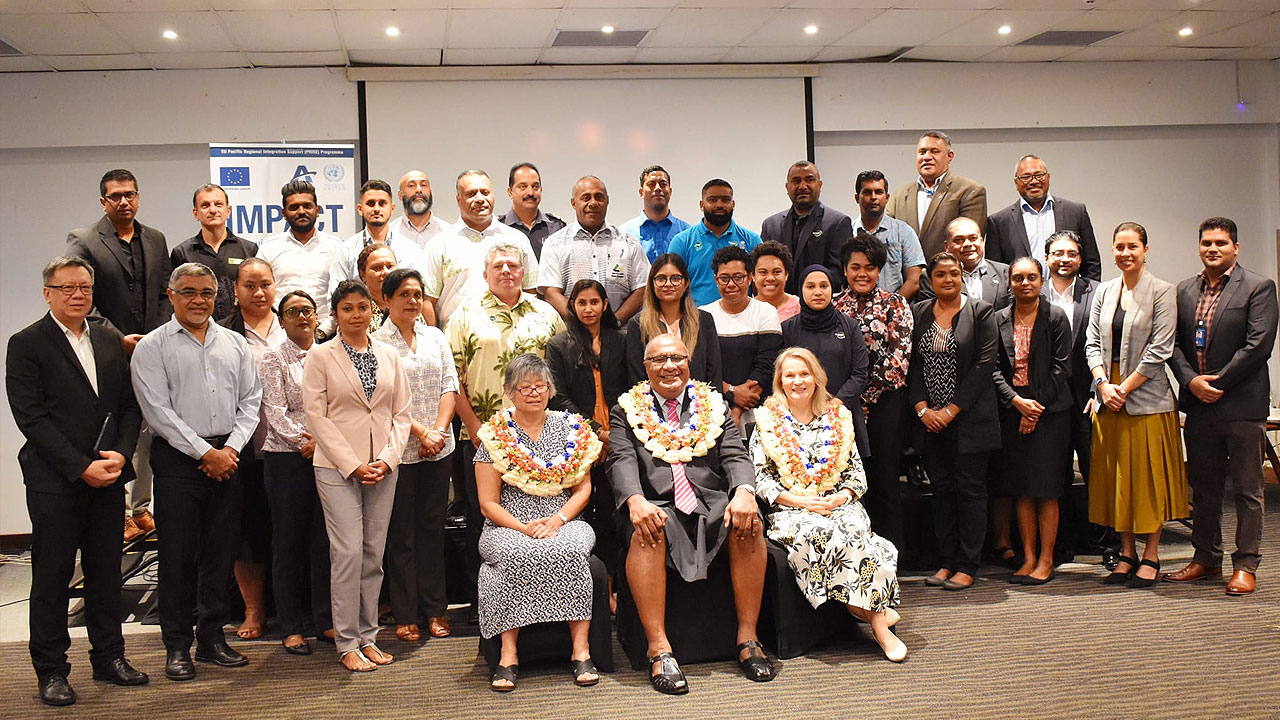Read this document in French:
Click on the language tab found at the bottom right of your screen and select French.


[27 June 2023: Suva] Fiji is taking a significant stride towards simplifying and harmonizing its trade procedures through a National Single Window System. This system, recommended under the World Trade Organization’s Trade Facilitation Agreement (WTO TFA), aims to streamline and digitize the country’s entire trade process, from pre-arrival to post-departure.
To assist Fiji in developing a system, the United Nations Conference on Trade and Development (UNCTAD), as part of the European Union (EU) funded Improving Pacific Islands Customs and Trade (IMPACT) Project, developed the Blueprint for the Fiji National Single Window (FNSW). This serves as a comprehensive roadmap guiding the implementation of this efficient trade facilitation mechanism.
By ratifying the WTO TFA and adhering to Article 10.4, Fiji is now paving the way for the electronic exchange of trade-related information and documents between government agencies.
The FNSW System will improve efficiency, reduce costs, increase transparency, and improve competitiveness by reducing the number of manual processes carried out by each agency involved in the trade clearance process. It will also provide a centralized platform for traders to submit trade-related information and documents thus reducing the need for multiple submissions.
The validation workshop held today provided an opportunity for all relevant stakeholders including government agencies, private sector entities, and end-users to participate in the decision-making process and contribute their expertise towards the FNSW blueprint.
This engagement is crucial to ensuring that the FNSW system addresses the specific needs, concerns, and requirements of different stakeholders, thus maximizing the benefits of trade facilitation for Fiji.
Fiji’s Deputy Prime Minister and Minister for Trade, Co-operatives and SMEs and Communications, Honourable Manoa Kamikamica in his keynote address noted that one of the most significant advantages is the expected improved coordination and collaboration among various government agencies involved in trade facilitation.
He added that by breaking down silos and fostering interagency cooperation, the government can optimise resources and deliver services more effectively.
“We envision a business-friendly environment in Fiji, where the time and cost of doing business are minimised, and our businesses and exporters are fully supported,” Honourable Kamikamica stated.
United Nations Resident Coordinator a.i. for Fiji, Solomon Islands, Tonga, Tuvalu and Vanuatu, Ms Andie Fong Toy said that the implementation of a Single Window System in Fiji would enhance the country’s competitiveness, promote economic growth, and improve the ease of doing business.
“The Fiji Government’s commitment to the WTO TFA and the implementation of a Single Window System is a positive step towards a more efficient and modern trade environment in the country,” Ms Fong Toy added.
The blueprint serves as the cornerstone for the future establishment of a streamlined and efficient Single Window system in Fiji.
The Deputy Head of the Delegation of the European Union to the Pacific, Dr Erja Askola acknowledged that the development of the FNSW blueprint comes in view of the EU’s bilateral partnership with Fiji, adding that EU is working with partners like UNCTAD to improve trade facilitation in Pacific countries.
“The single window and the digital solutions are precisely what we need to save money and time when crossing borders with our goods and also to improve transparency,” Dr Askola stated.
Regional Coordinator for the ASYCUDA programme in the Pacific, Mr Jayvee Santos said that Fiji’s trade and investment competitiveness depends heavily on the ability of its official border agencies to efficiently receive, process and disseminate information across the national trade supply chain.
“In recognition of this dependency, we are gathered here today to reach an understanding of expediting and simplifying information flows between trade and regulatory agencies,” Mr Santos said.
The EUR 10 million IMPACT Project is part of the EU-funded Pacific Regional Integration Support (PRISE) programme that aims to increase the quality and the volume of goods traded intra-regionally between Pacific Island countries and internationally, including with the EU’s 27-member States.
